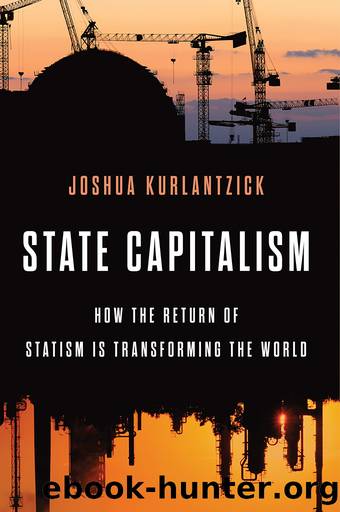State Capitalism by Kurlantzick Joshua;

Author:Kurlantzick, Joshua; [Kurlantzick, Joshua;]
Language: eng
Format: epub
ISBN: 9780199385706
Publisher: OxfordUP
Published: 2016-09-15T00:00:00+00:00
HOW DEMOCRACY AND STATE CAPITALISM COULD COEXIST
Although the examples of Thailand, South Africa, and Argentina seem to suggest that state capitalism inevitably erodes democratic freedom, in some countries economic statism coexists with political openness, indicating that state capitalism is not such a threat to democratic freedoms in countries that already have strong democratic institutions and cultures. State capitalism is one factor that may foster democratic regression, but in itself it does not automatically cause political regression; it is not even necessarily correlated with political regression.
Although individual leaders play a role in maintaining democratic politics in a state-driven economy, they are not the only guardians of democracy in countries like Indonesia, Norway, or Brazil; if they were, state capitalism would inevitably undermine every democracy, since the quality of leadership in any country ranges widely. But, if state capitalist countries are also able to create independent institutions insulated from the power of the executiveâand thus insulated from the executiveâs control of state companiesâthese institutions can help preserve democracy even as statist economics expand. For example, Indonesia has created a truly independent agency to investigate graft cases; the Corruption Eradication Commission has wide-ranging police powers that, in some ways, exceed those of the regular Indonesian police. The commission, established only a decade ago, has quickly become a powerful check on the use of state economic tools for patronage and self-dealing. Though Indonesia still suffers from serious graft problems, a legacy of the Suharto regime, the Corruption Eradication Commission has pursued some of the most powerful politicians and has notched a 100 percent conviction rate in its cases. Unlike the Directorate of Special Operations, the elite police unit created in post-apartheid South Africa to combat graft and organized crime, Indonesiaâs anti-corruption commission is not directly controlled by elected leaders and so cannot be easily manipulated; in recent years the commission has launched high-profile investigations into some of the closest allies of Susilo Bambang Yudhoyono, during Yudhoyonoâs time as president. (The Directorate of Special Operations, known in South Africa by its nickname, the âScorpions,â were defanged and then essentially disbanded at the end of the Mbeki era, just as it was investigating allegations of bribery by political allies of South Africaâs next president, Jacob Zuma.) To Yudhoyonoâs credit, he did not block the commissionâs investigation into his political allies, and in late 2014 the commission announced it was investigating Yudhoyonoâs son on allegations of accepting bribes.
Singapore, though not as democratic as Indonesia, long ago created checks on state power that are relatively insulated from the reach of individual politicians. These checks have remained strong as the city-state has become more open politically, with a real opposition party and a much freer atmosphere for speech and expression than even a decade ago. The Political and Economic Risk Consultancy, a leading Asia-Pacific business analysis firm, has consistently ranked Singaporeâs judiciary as the fairest in Asia.18
Norway, perhaps the most successful example of combining state capitalism with vibrant democracy, uses similar strategies as Singapore. Even as Norwayâs economy has
Download
This site does not store any files on its server. We only index and link to content provided by other sites. Please contact the content providers to delete copyright contents if any and email us, we'll remove relevant links or contents immediately.
International Integration of the Brazilian Economy by Elias C. Grivoyannis(74887)
The Radium Girls by Kate Moore(11621)
Turbulence by E. J. Noyes(7700)
Nudge - Improving Decisions about Health, Wealth, and Happiness by Thaler Sunstein(7242)
The Black Swan by Nassim Nicholas Taleb(6765)
Rich Dad Poor Dad by Robert T. Kiyosaki(6176)
Pioneering Portfolio Management by David F. Swensen(6079)
Man-made Catastrophes and Risk Information Concealment by Dmitry Chernov & Didier Sornette(5649)
Zero to One by Peter Thiel(5490)
Secrecy World by Jake Bernstein(4388)
Millionaire: The Philanderer, Gambler, and Duelist Who Invented Modern Finance by Janet Gleeson(4096)
The Age of Surveillance Capitalism by Shoshana Zuboff(3985)
Skin in the Game by Nassim Nicholas Taleb(3965)
The Money Culture by Michael Lewis(3847)
Bullshit Jobs by David Graeber(3831)
Skin in the Game: Hidden Asymmetries in Daily Life by Nassim Nicholas Taleb(3723)
The Dhandho Investor by Mohnish Pabrai(3560)
The Wisdom of Finance by Mihir Desai(3524)
Blockchain Basics by Daniel Drescher(3329)
